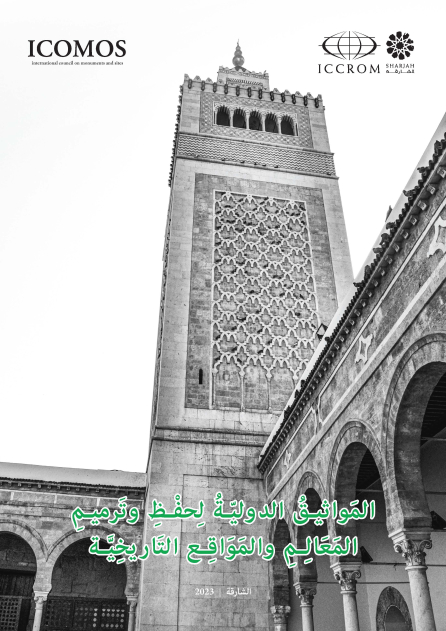30 January 2024, Rome, Italy – This resource has been published as part of a collaboration between the International Council on Monuments and Sites (ICOMOS) and the Regional Office for Cultural Heritage Preservation in the Arab Region (ICCROM-Sharjah). The collaboration is supported by His Highness Sheikh Dr Sultan bin Muhammad Al Qasimi, ruler of Sharjah and member of the Federal Supreme Council of the United Arab Emirates. This partnership aligns with ICCROM-Sharjah’s mission to assist Member States in the Arab region to conserve cultural heritage.
This book aims to equip Arabic-speaking experts, practitioners, academics, researchers and local and regional legislators with the best practice in cultural heritage preservation and management. It also endeavours to enhance regional and national institutional capacities in the Arab region to conserve cultural heritage sustainably.
The International Charters for the Conservation and Restoration of Monuments and Sites is a comprehensive resource featuring a variety of international charters and declarations related to the preservation and restoration of cultural heritage established by ICOMOS and other relevant international organizations. Many types of ICOMOS texts are included – charters, declarations, guidelines and documents – created and adopted by ICOMOS bodies, ranging from the ICOMOS General Assembly to ICOMOS National and Scientific Committees.
This publication addresses diverse forms of cultural heritage, including historic sites, monuments, buildings, archaeological sites, cultural landscapes, historic urban areas, historic parks and more. The texts cover a broad range of topics and concepts related to the protection and sustainability of cultural heritage through documentation, registration, analysis, evaluation, restoration, education, training, sustainable management, public awareness and the promotion of sustainable cultural tourism.
Overall, this publication showcases the evolution of conservation and preservation principles derived from these documents issued by ICOMOS: starting with the 1964 Venice Charter focusing on architectural historic landmarks and extending to more recent charters and declarations addressing the conservation of built heritage, historic gardens and urban areas. Since the Venice Charter, ICOMOS has built a solid philosophical, doctrinal and managerial framework for the sustainable conservation of cultural heritage worldwide.
We look forward to this publication achieving its primary and desired purpose: to build the capacity of Arabic-speaking professionals and researchers to implement best practices in cultural heritage conservation projects and promote cultural heritage values and authenticity through its protection and safeguarding for future generations.
The International Centre for the Study of the Preservation and Restoration of Cultural Property (ICCROM) is an intergovernmental organization working in service to its Member States to promote the conservation of all forms of cultural heritage in every region of the world. For more than six decades, ICCROM has partnered with Member States to support them in safeguarding heritage within their borders and beyond. Working at the international and governmental levels, and with institutions and professionals on the ground, the organization engages and informs new generations of professionals and the general public with an interest in heritage.
The International Council on Monuments and Sites (ICOMOS) is a non-governmental, not for profit international organization committed to furthering the conservation, protection, use and enhancement of the world’s cultural heritage. With over 12 000 members, 100+ National Committees, 31 International Scientific Committees and several Working Groups, ICOMOS has built a solid philosophical, doctrinal and managerial framework for the sustainable conservation of heritage around the world. As an official advisory body to the World Heritage Committee for the implementation of the UNESCO World Heritage Convention, ICOMOS evaluates nominations and advises on the state of conservation of properties inscribed on the World Heritage List.

